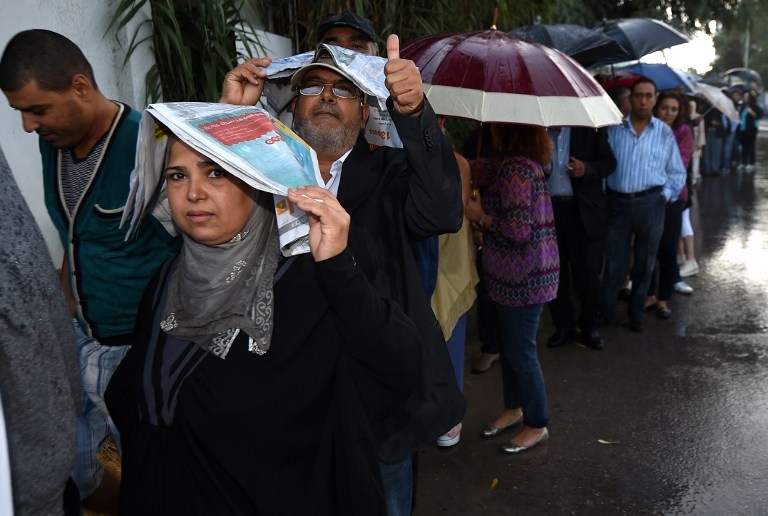Voter turnout appears high as Tunisians take to the polls for 'historic' vote

Tunisians vote Sunday in an election seen as pivotal to establishing democracy in the cradle of the Arab Spring uprisings.
When polls opened at 7:00 am (0600 GMT), dozens of voters were already queueing outside one polling station in Marseille Street in central Tunis, according to reports.
While reliable voter turnout figures were not immediately available on Sunday, anecdotal evidence - including longer lines at polling places - and observers on the ground seemed to indicate that turnout has been much higher than the elections in 2011.
A source who is monitoring the elections confirmed that turnout is higher this time, but said he could not offer figures while election monitoring continued.
The North African nation has been hailed as a beacon of hope compared with other chaos-hit countries like Libya and Egypt where regimes were also toppled.
As Prime Minister Mehdi Jomaa voted on Sunday, he hailed the vote as "historic".
"The spotlight is on us and the success of this (vote) is a guarantee for the future... a glimmer of hope for this region's young people," he told local radio as he voted.
One Tunisian couple reportedly married on Sunday morning - and then headed to the polls to cast their votes.
Jomaa had warned of possible militant attacks aimed at disrupting the country's first post-revolution parliamentary election and, on Sunday, up to 80,000 troops and police were deployed in case of any attacks.
On Friday, Tunisian police killed six suspected militants- five of whom were women - in a raid on a house in the outskirts of the capital. A policeman was also killed in an earlier firefight with the suspects.
Troubled transition
The country has flirted with disaster in recent years, particularly in 2013 when a rise in militant activity and the assassination of two opposition lawmakers threatened to derail Tunisia's path to democracy after its 2011 uprising that inspired the Arab Spring protests.
The revolt ousted veteran autocrat Zine El Abidine Ben Ali and ushered in a coalition government and interim president that won praise from the international community.
Several parties competing for seats in parliament are fronted by former regime officials.
Voters could be seen exiting polling stations with index fingers dyed in ink - a measure designed to prevent people casting multiple ballots - held up in celebration.
'Attached to democracy'
The election is pitting Ennahda against secular rival Nidaa Tounes (Call of Tunisia) and an array of leftist and Islamist groups.
Ennahda leader Rachid Ghannouchi has predicted his party will improve on the 37 percent of the vote it won three years ago in an election to a constituent assembly, which drew up the post-Ben Ali constitution.
But Nidaa Tounes officials say they expect the party and Ennahda to split 150 of the 217 seats in the new parliament.
Nidaa Tounes chief Beji Caid Essebsi cut in front of queueing voters to cast his ballot in his constituency in a Tunis suburb.
"I voted for Tunisia. Long live Tunisia," he said.
Ghannouchi, who chose to wait in line to cast his vote, said he was encouraged by the long queues forming at polling stations.
Middle East Eye propose une couverture et une analyse indépendantes et incomparables du Moyen-Orient, de l’Afrique du Nord et d’autres régions du monde. Pour en savoir plus sur la reprise de ce contenu et les frais qui s’appliquent, veuillez remplir ce formulaire [en anglais]. Pour en savoir plus sur MEE, cliquez ici [en anglais].

